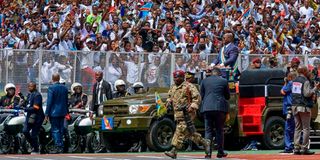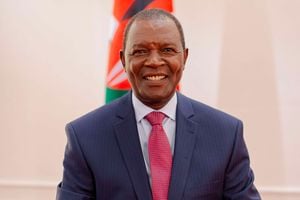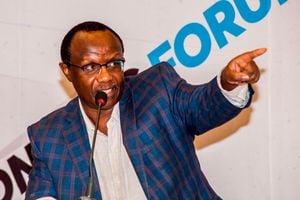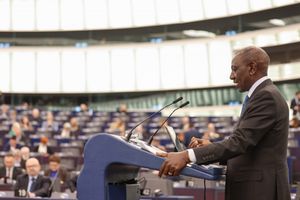President Ruto, Uhuru Kenyatta share podium at Felix Tshisekedi swearing-in

President William Ruto accompanied by Prime Cabinet Secretary Musalia Mudavadi during the swearing in ceremony of President Felix Tshisekedi of Congo DR at the Stade des Martyrs in Kinshasa on January 20, 2024.
President William Ruto and his predecessor Uhuru Kenyatta Saturday shared a podium when they both attended the swearing-in ceremony of Democratic Republic of Congo President Félix Tshisekedi’s second term in office.
Mr Tshisekedi beat his closest challenger Martin Fayulu in a chaotic and disputed election, and after a long campaign in which Nairobi, and indeed, the East African Community’s role was pronounced.
For Nairobi, the most memorable—almost make-or-break—moment was in December when Kinshasa recalled its envoy in Kenya, John Nyakeru, to protest a meeting of rebel leaders in Nairobi where they formed a collation to unseat President Tshisekedi.

Former President Uhuru Kenyatta arrives at N'Djili International Airport in the Democratic Republic of Congo head of the inauguration ceremony of the president-elect Félix Antoine Tshisekedi Tshilombo on January 19 2024
Kenya distanced itself from the meeting, but President Ruto insisted that it had refused a request from Kinshasa to arrest the rebels. “DRC wanted to know whether we could arrest those people. I told them: ‘Kenya is a democracy. We cannot arrest anybody who has issued a statement. We do not arrest people for making statements, we arrest criminals’. If anybody has committed any criminality, we will go out of our way to deal with them’,” he told journalists at State House after the incident.
DRC’s government spokesperson Patrick Muyaya had condemned Kenya for hosting “a destructive alliance” and warned that “it will impact diplomatic relations.”
In the same month, and weeks to the elections, DRC reportedly refused to grant election observer status to an EAC team. “The EAC will not be physically present in DRC to observe her 2023 General Election as provided for in the treaty establishing the EAC, and has been the practice since the inception of the EAC. This development is due to the fact that although the EAC was ready, the request to undertake the exercise has not been granted by the relevant authorities,” read EAC statement on December 18.
DRC has an on-off relationship with EAC, which it joined in May 2022, and is yet to fully accede to all its relevant protocols.
Mr Kenyatta travelled to Kinshasa through a Uganda Airlines plane, a departure from the Kenya Air Force that he had been accustomed to since leaving office.
Inauguration ceremony
“President (Rtd) Uhuru Kenyatta has this evening arrived at N’Djili International Airport in the Democratic Republic of Congo (DRC) ahead of the inauguration ceremony of the president-elect Félix Antoine Tshisekedi Tshilombo,” Uhuru press team announced.
He flew on the same plane as Uganda’s Vice President Jessica Alupo, who was representing President Yoweri Museveni in the oath-taking ceremony.

DRC President Felix Tshisekedi (C) greets supporters as he arrives for his swearing-in ceremony at the Stade des Martyrs in Kinshasa, on January 20, 2024.
The bloc was late in deploying a military mission in the DRC, known as the EAC Regional Force, but its mandate ended on December 8, 2023, amid controversy, and with Kinshasa constantly having complained about its effectiveness.
Mr Kenyatta, as a facilitator of an EAC-led process, was mandated by the bloc to facilitate the peace process in DRC where the state was at war with rebels.
In October 2023, DR Congo’s government said it would not extend the Regional Force’s mandate. It gave troops from the southern African bloc SADC the mandate “to support the Congolese army in fighting and eradicating the M23 and other armed groups that continue to disrupt peace and security”.
It remains to be seen whether SADC can contain DR Congo’s multiplicity of militias, which the forces before them, including the UN peacekeepers who have been in the country since 1999, have failed to do.
Mr Tshisekedi took over in his first term in January 2019, after beating Martin Fayulu in yet another controversial election, to take over from Joseph Kabila.
During the event in 2019, only one, President Kenyatta, attended Tshisekedi’s swearing-in, despite the DRC government inviting 17 others from Tanzania, Zimbabwe, Malawi, South Africa, Ethiopia Sudan, Sudan, Egypt, Sierra Leone and Haïti.
The 17, however, only sent representatives to the ceremony which took place at the state’s Presidential Palace in Kinshasa.





